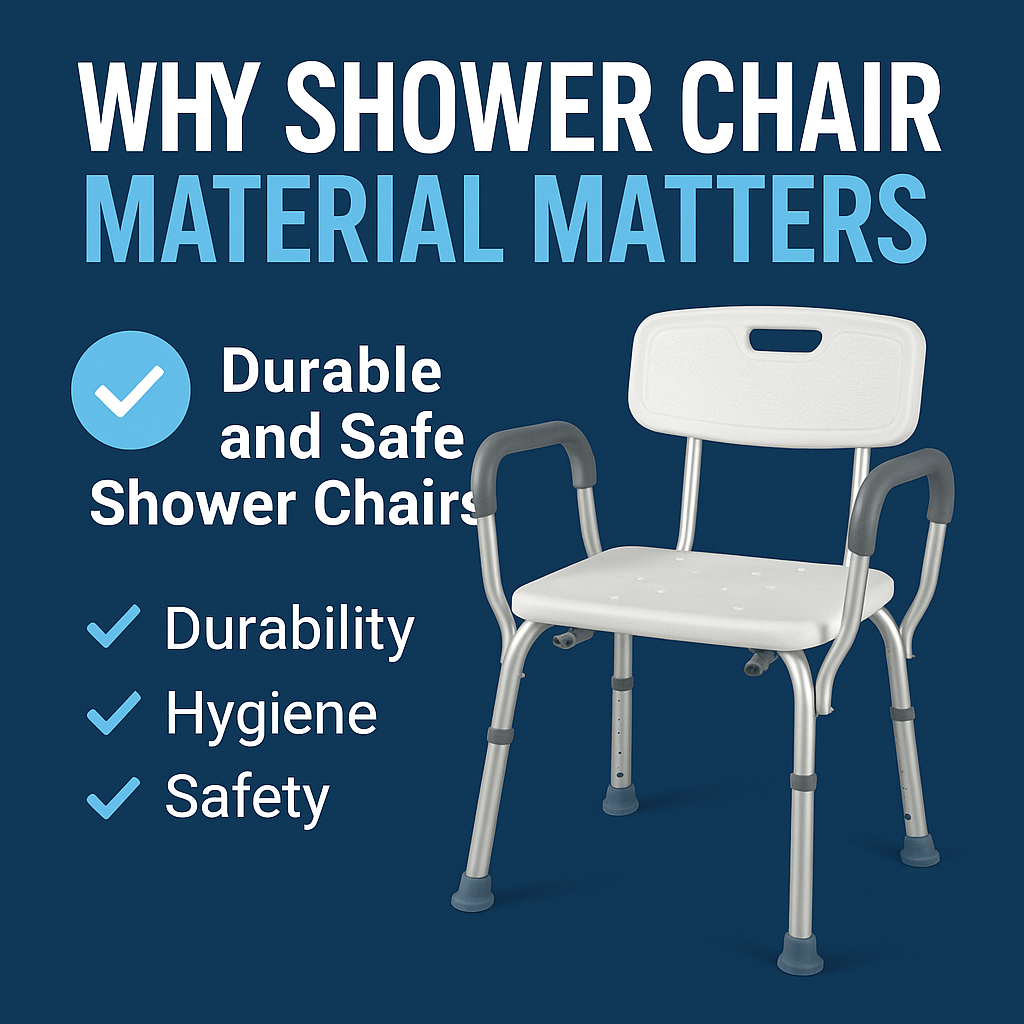In healthcare facilities, nursing homes, and home care environments, shower chairs are critical devices that ensure patient safety and comfort. While features such as foldability and adjustability matter, the material of a shower chair often determines its long-term durability, hygiene, and performance. Understanding these material differences is crucial for care providers, hospital procurement teams, and distributors sourcing reliable rehabilitation equipment.
Why Material Choice Matters
The choice of shower chair material directly impacts durability, hygiene, and patient safety.
Durability and Load-Bearing Capacity
Shower chairs face constant exposure to water, soaps, and disinfectants. Aluminum alloy frames resist corrosion while maintaining structural strength, making them ideal for high-traffic hospital and nursing home environments. In contrast, untreated steel may rust, weakening joints and increasing safety risks. High-quality PE (polyethylene) or PP (polypropylene) seats combine flexibility with impact resistance, preventing cracks or breaks during frequent use.
Safety: Slip Resistance and Stability
The seat and backrest material influence slip resistance. Textured PE seats or EVA padded seats reduce the chance of sliding, crucial for elderly patients or users with limited mobility. Frame material also affects stability: lightweight aluminum frames provide robust support without compromising maneuverability, whereas lower-grade metals may bend or deform under uneven weight distribution.
Hygiene and Maintenance
In healthcare settings, materials must withstand rigorous cleaning. Plastic composites like PE/PP and powder-coated metals resist mold, bacterial growth, and chemical corrosion. Materials that degrade quickly under disinfectants compromise patient safety and increase maintenance costs.
Material Innovation in Modern Shower Chairs
Modern rehabilitation equipment often features hybrid designs, combining aluminum frames with PE/EVA seats. Some chairs include antimicrobial coatings that reduce infection risks without adding weight or complexity, optimizing both hygiene and longevity.
Choosing the Right Material for Your Environment
-
Hospitals: Require chairs that handle heavy daily use, strong disinfectants, and occasional mechanical stress. Stainless steel or high-grade aluminum frames with PE/PP seats are recommended.
-
Nursing Homes: Comfort is equally important. EVA padding or ergonomic PE seats improve long-term usability.
-
Home Care: Lightweight, foldable aluminum frames with molded plastic seats allow easy handling and storage while maintaining safety standards.
Conclusion
Selecting the right shower chair material is not just a technical detail—it directly impacts safety, hygiene, and durability. Understanding material properties enables caregivers, hospital procurement teams, and distributors to choose chairs that meet both practical requirements and regulatory standards. For B2B buyers sourcing reliable rehabilitation equipment, this knowledge ensures safer, longer-lasting solutions for patients and residents.
KDB is a professional rehabilitation equipment manufacturer integrating R&D, production, sales, and service. With 13+ years of OEM/ODM experience, ISO 13485 certified factory, and a wide range of shower chairs and commode chairs, we support small-batch customization and reliable after-sales service.
Explore our products: https://www.kdbhealth.com/shower-chair
Contact: [email protected]

